Mladen and Del review ‘Cloverfield’
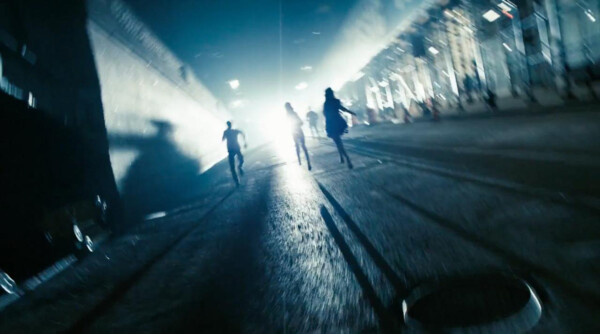
Image courtesy of Paramount Pictures.
—
“Cloverfield” Starring Lizzy Caplan, Jessica Lucas, T. J. Miller, Michael Stahl-David. Directed by Matt Reeves; created by J.J. Abrams. 85 minutes. Rated PG-13.
Mladen’s take
An amphibious monster, stories tall or a couple of blocks long, depending on the way you want to measure the beast, attacks Manhattan and it’s plausible.
That’s what makes “Cloverfield” work — the director takes the movie’s premise seriously.
Though “Cloverfield” sucks as a title, the movie becomes riveting after it finally cuts to explosions, toppled buildings, gunfire and missile and bomb attacks.
“Cloverfield” is realistic because it’s shot from the street-level point of view of a handful of people while the scaleless monster rampages through New York. The frenetic, jittery perspective you see on the big screen is captured by one of the survivors, who’s wielding a camcorder with the longest-lasting battery ever manufactured.
The CGI and the real blend flawlessly in this movie.
At any moment I expected cameraman Hud to focus on a still-functioning TV at an electronics story being looted as mayhem sweeps the island. President Bush comes on, the TV screen flickering.
“My fellow Americans, we are in a long war with monsters,” he would have said. “I don’t know when it will end, maybe never, but we will achieve victory. To protect you, I’m suspending all civil liberties and disbanding Congress. I can do that. It’s in the Constitution. Ask Dick Cheney. There’s no time for silliness like democracy while radical Islamic fundamentalist jihadist terrorists unleash such furry — ah, fury — on the good, holy people of America. God bless me, your savior.”
Like GM and Ford are finally starting to build cars that can compete with Japanese brands, Hollywood has finally released a movie that can compete with Japanese giant monsters such as Godzilla and Gamera.
See “Cloverfield” while it’s in theaters. Go to the bathroom and buy popcorn sometime during the movie’s first 20 minutes, which are spittle, and then prepare for a jolt.

Del’s take
“Scaleless monster”? Mladen. I never thought of you as a dermaphobe.
Still, “Cloverfield” is a romp ’em stomp ’em bad ass monster of a movie, and anybody who disagrees needs to have his aura adjusted by a Marine drill sergeant.
OK, so the first 20 minutes are more “Quarterlife” than “Die Hard.” So what? That’s the part where we learn the viewpoint characters are as insipid and selfish as we. How else could we know that Rob is a metrosexual wussie who believes “commitment” is a dish best served cold?
But once the infrastructure starts rolling down the streets it’s a cinema verite grudge match featuring the icons of order vs. the forces beyond our control in a mighty metaphor for what’s happening in the world around us. If the U.S. could have dropped the “Cloverfield” monster on Fallujah, Barack Obama would be running a distant third.
Yes, we can niggle. How could that monster jump at a helicopter? What happened to Marlena behind the curtain? And in the movie’s final scene, did you really see something fall into the water? Oooh.
I just wish people would stop Blair Bitching about the jiggly camera motion – take a dramamine and call me in the morning. Ever read “The Sound and the Fury”? William Faulkner thought of the idea decades ago. If you can live with it on YouTube you can live with it in “Cloverfield.”
I think J.J. Abrams has kicked some serious Godzilla booty. This is not narrative storytelling. It’s slice-of-death moviemaking for a generation of voyeurs and narcissists who measure their worth in terms of the body count on their Facebook friends list.
In the movie’s penultimate scene we hear two very loud noises. Those were the sounds of a genre cracking under the weight of its own inertia and crashing into a new and limitless ocean of creative expression.
Let’s hope “Cloverfield” sinks a few ships.
Mladen Rudman is a former journalist and technical editor. Del Stone Jr. is a former journalist and author.

Simon, Alvin and Theodore beam at the prospects of their first holiday together with Dave Seville.
“Alvin and the Chipmunks” Starring Jason Lee, David Cross, Cameron Richardson and the voices of Justin Long, Matthew Gray Gubler and Jesse McCartney. Directed by Tim Hill. 92 minutes. Rated PG.
Del’s take
I spent more time watching the clock than “Alvin and the Chipmunks.”
But hey, it’s a kids’ movie … a 92-minute long kids’ movie that takes three days and a barf bag to watch.
Seriously, I found no fatal flaws in “Alvin and the Chipmunks.” I’m sure it’s a perfectly serviceable kids’ movie – despite the tired, hackneyed, derivative plot elements that seem cut and paste from about every animated/CGI-generated kids’ movie of the past 10 years.
In “Alvin and the Chipmunks,” our three favorite rodents (not counting Bush, Cheney and Rumsfeld) show up at the home of failed music writer Dave Seville (Jason Lee) and wreak havoc. Dave shows them the door – but invites them back when he discovers they can sing … just the “latest thing” to galvanize his music career.
From there the movie becomes a predictable and boring pastiche of cliches – the chipmunks become rock stars and are exploited by greedy businesspeople … Dave starts to think of the chipmunks as his kids … Dave nearly loses the girl but with the chipmunks’ help gets her back … blah blah blah.
But hey, it’s a kids’ movie, so who cares?
Sorry, but I just couldn’t overlook the property damage, career setbacks and disgusting personal hygiene issues wrought by these rodents. Fart jokes and eating a poop? Pass the Pepto-Bismol.
At my house these rats would be singing the blues as I sic the cat on them.
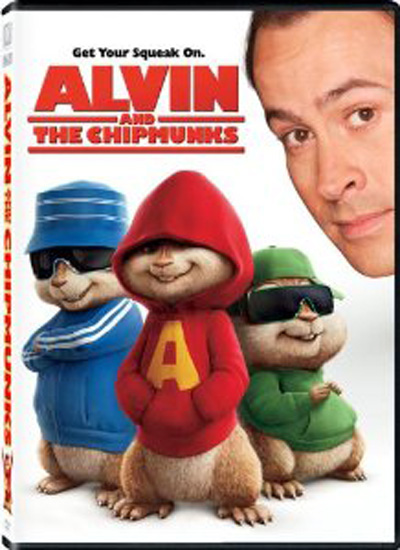
Mladen’s take
Maybe I liked “Alvin and the Chipmunks” because it had only one fart gag.
Maybe it was the clever scene where Alvin inhaled helium from a balloon and his voice got lower.
Maybe I like the film because Del doesn’t. What’s the big deal about Simon eating Theodore’s poop pellet, anyway? Aren’t chipmunk’s vegetarians? So, it’s not like the pellet was all fetid and putrid with flies swarming.
“Alvin and the Chipmunks” is funny much of the time and avoids being annoying, no small feat because the chipmunks’ testosterone-less voices could drive a person nuts.
“Dave,” played by Jason Lee, does a good job of imagining the singing rodent trio exists.
The same skillful ability to see what isn’t there is applied by the bad guy music industry executive exploiting Alvin, Simon and Theodore for all they’re worth. As it turns out, the money isn’t in the singing but the merchandising.
Nor does the movie wear out its welcome by being too long or using double entendre to appeal to adults.
The chipmunks are the film’s only CGI, adding a sense of reality that makes the movie feel authentic even if grumpy Del insists the plot is re-tread.
If you have kids, don’t rent the movie, buy it.
“Alvin and the Chipmunks” is very likely a film they’ll want to see more than thrice, which means it’ll pay for itself in no time.
Mladen Rudman is a former journalist and technical editor. Del Stone Jr. is a journalist and author.
Video
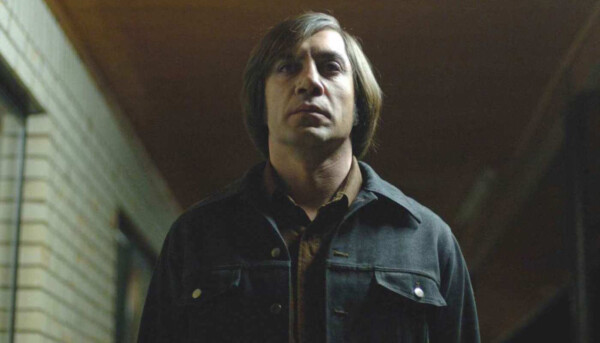
“No Country for Old Men” Directed by Ethan and Joel Coen. Starring Tommy Lee Jones, Javier Bardem, Josh Brolin, Woody Harrelson, Kelly MacDonald. 122 minutes. Rated R.
Mladen’s take
The most interesting part of “No Country for Old Men” comes at the end of the film during the credits.
The film’s makers claim, “This is a carbon neutral production: 100% of carbon emissions offset with Native Energy.”
Dang, what a bold, confident statement. How did producers know the movie is carbon-neutral with such certainty? Did they calculate the oil- or natural gas- or coal-based energy it took to train the animals in the film? Or the noxious, atmosphere-heating gases produced by a burning car? Or using blanks in the silencer-equipped, 12-gauge shotgun wielded by the delightfully remorseless killer portrayed by Javier Bardem?
“No Country for Old Men” is a good movie, regardless of its carbon-neutrality. Why it got the nod for best motion picture of the year is beyond me, though.
It’s a slick film with Texas’ austere plains and mountains as backdrop. Dialogue is good and all of the characters interesting but “No Country for Old Men” is, essentially, little more than a shoot ’em up movie. The plot is tired, despite the penumbra of some hifalutin philosophical talk and events looking at the way fate plays with mankind.
“No Country for Old Men” lacks the dastardly humor of the Coen brothers’ “Fargo” or the flippant violence in “Raising Arizona,” which are better films.
If you go to a video store and “No Country for Old Men” is rented, don’t worry; it’s not a must-see despite its credentials.

Del’s take
Like Mladen asked, “No Country for Old Men” was a good movie but was it worthy of an Oscar?
Maybe in a weak year. Apparently 2007 was just such a year.
In “No Country for Old Men,” Josh Brolin stumbles across a drug deal gone bad. He makes off with the cash. Meanwhile, the druggies hire Javier Bardem to track him down. Tommy Lee Jones is the sheriff who seems to be one step behind the bad guys – on purpose.
The visuals are excellent. Dialogue is excellent. Performances range from good to excellent – I wasn’t impressed by Brolin’s interpretation of the Llewelyn Moss character but Bardem truly deserved an Oscar for his portrayal of killer Anton Chigurh.
I’m not sure what to make of the movie’s overall subtext. I mean, clearly it meant to say: The country has gone to hell in a hand-basket. Bardem’s character is a killer who attributes his amorality to fate, an easy balm for the conscience. Jones’ character is easily understandable as the reluctant sheriff who only wants to survive until retirement. But dirty deeds done dirt cheap have been with us a long, long time, and I’m not sure you can attribute them to Mom and Dad letting Britney dye her hair green.
Bardem is T-boned in an accident that leaves a bone protruding from his arm. He buys the shirt off a teenaged boy’s back and uses it to make a sling. Then he walks away from the accident as sirens wail in the distance. Is this an illustration of the amorality of fate, or a kind of karmic balancing of the equation?
“No Country for Old Men” doesn’t answer that question, and I think that’s where it falls short.
I would say watch it and make your own judgment.
Mladen Rudman is a former journalist and technical editor. Del Stone Jr. is a former journalist and author.

(Clockwise from top) Martin Luther McCoy as Jo-Jo, Dana Fuchs as Sadie, T.V. Carpio as Prudence, Ekaterina Sknavina as Rita, Evan Rachel Wood as Lucy, Jim Sturgess as Jude, Kiva Dawson as MaxÕs Girl, Joe Anderson as Max, and Halley Wegryn Gross as Max's Girl in Revolution Studios' "Across the Universe." Photo Credit: Abbot Genser SONY PICTURES ENTERTAINMENT INC.
“Across the Universe” Starring Evan Rachel Wood, Jim Sturgess, Joe Anderson, Dana Fuchs, Martin Luther, and T.V. Carpio. Directed by Julie Taymor. Rated PG-13. 131 minutes.
Del’s take
About 15 minutes into “Across the Universe” I decided a review massacre was in order. By movie’s end, however, I had changed my mind. The movie didn’t work for me and I wanted to know why.
I thought about it all night. I used up precious REM sleep grinding my teeth on the issue. And sometime between bedrise and showertime I hit upon the answer:
Its moment had passed.
But not for the reasons you think.
“Across the Universe” is a homage to The Beatles, the ’60s, Vietnam War protests and the civil rights movement. It features Jude, a mop-topped lad from Liverpool who comes to America to find his father, who abandoned his mother in the Old Sod after World War II. Jude meets Max and falls in love with Max’s sister, Lucy. This unlikely trio hooks up with a New York crowd of artists and protesters who experiment with LSD, reinvent music and get clubbed in the head by truncheon-wielding cops.
The characters have an annoying habit of lapsing into song at almost every turn – re-mastered Beatles tunes as it were. The ratio of singing to storytelling is about 10 to 1. Unless you’re a huge fan of the Fab Four you’ll catch yourself rolling your eyes as Jude, frustrated by Lucy’s evolving radicalization by the anti-war movement, manifests his angst through a singing and strawberry-flinging hissy fit.
But the problem with “Across the Universe” is that it no longer works. The Beatles’ were replaced by new wave, grunge, hip-hop and emo. The “turn on, tune in, drop out” moment doesn’t exist. We have another Vietnam raging in the Middle East, and the civil rights movement has become a pale shadow of its former self.
More significantly, young people no longer feel the passion that once energized those social changes.
Back in the 1980s the kids were known as the “Me Generation.” But self-absorption on a cultural scale didn’t exist until the 2000s, when the gadget-pampered, media-beatified children of the ’80s and ’90s came of age.
The young people of the ’60s did what they did, no matter how wrong or stupid, because they were charged with a passion for revolution. At least some of them believed they could change the world.
But that passion is gone. Instead, we have a pretense of passion whose underlying motivation is self-aggrandizement, and it just rings hollow. People don’t march through the streets to bring change; they march through the streets to get on TV.
That’s why “Across the Universe” didn’t work for me. It was like watching Howdy Doody shout, “Hell no, we won’t go!”
When I see mobs of long-haired, placard-carrying hippies surrounding the White House and demanding that Bush pull out of Iraq, I’ll change my mind about “Across the Universe.”
Until then, I give it 10 big yawns.

Mladen’s take
A movie’s place in time shouldn’t influence its entertainment value.
“Across the Universe” is set in the turbulently kitschy 1960s but that doesn’t mean the movie needed to suck in the attention-deficit-disorder 2000s.
“Across the Universe” would have been crap in 1965, too.
Sweeping aside Del’s huffing and puffing about our selfish, publicity-seeking youth by noting that’s what all youth everywhere are at any given moment, leaves only the prospect of reviewing “Across the Universe” on its own merit.
The movie is little more than a montage of The Beatles songs. It would have been tolerable if more nudity and violence were offered, but that’s only two of several mistakes.
The creators of “Across the Universe” took Fab Four tunes and built a movie around them.
What they should have done was write a coherent script and cherry-picked The Beatles songs that fit. The result could have been both a good movie and a celebration of the Fab Four.
That said, I should come clean with a couple of prejudices.
First, the only thing good about The Beatles was Paul McCartney and that’s only after he founded Wings. “Live and Let Die” is one of the greatest songs ever.
And, second, “Across the Universe” fails to use The Beatles most whimsical and charming song, “Yellow Submarine.”
How can you produce, direct or act in a movie featuring The Beatles songs without using “Yellow Submarine?”
“Across the Universe,” in part, uses Vietnam War-era unrest in the United States as a component of its shtick.
“Yellow Submarine” could have been the song that gaps the inane decisions made by politicians back then with the gallingly obtuse decisions made, and being made, by the Bush administration today.
That would have had two effects.
First, Del might have been less grumpy in his review of “Across the Universe” because it had a link to the present.
And, second, the movie would have helped me survive the next 10 months of Bush.
After all, couldn’t we all “sail on to the sun until we found a sea of green and (live) beneath the waves in our yellow submarine” prosperously in international waters until Jan. 21, 2009?
Mladen Rudman is a former journalist and technical editor. Del Stone Jr. is a former journalist and author.
Video
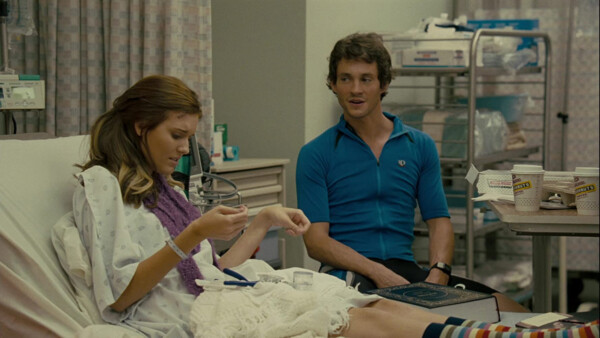
“The Jane Austen Book Club” Starring Maria Bello, Emily Blunt, Kathy Baker, Amy Brenneman, Maggie Grace, Jimmy Smits, Hugh Dancy. Directed by Robin Swicord. 106 interminable minutes. Rated PG-13.
Del’s take
When I suggested to Mladen we review something other than science fiction or horror I had no idea he’d go soft and squishy. But after consulting some of the ladies in our presence he came up with “The Jane Austen Book Club” which set my skin to crawling.
The words “Jane Austen” conjure an image of a spinster snuggled on the couch with her embroidery and her kitty cat, listening to classical music and fondly remembering the one and only night of her life that a beautiful man French-kissed her.
“The Jane Austen Book Club” stars the entire female population of Planet Amazonia, and Hugh Dancy. It is about a group of demasculating, wine-guzzling, teenage boy-seducing harpies who plot to subjugate the men in their lives by proposing an ultimatum: Read Jane Austen … OR ELSE. At least that’s what I got out of it.
Incredibly, the men cave to this ridiculous coercion and the movie wraps with a stomach-turning group cootie exchange.
Did I just give away the ending? Oh hell, I don’t care.
I find myself irritated by movies like “The Jane Austen Book Club.” The characters live in the most expensive state in the nation, wear stylish clothes, drive $40,000 Volvos, own mansions, don’t appear to ever work for a living … and wring their hands because hubby would rather watch a basketball game than rhapsodize about some lame English romance writer who died almost 200 years ago.
Gimme a break.
After watching “The Jane Austen Book Club” I felt the need to cleanse my palate with something more uplifting, like “Reservoir Dogs.”
Guys, do the words “chick flick” mean anything to you?
Stay away. Stay far, far away.
Ten million yawns.

Mladen’s take
I watched “The Jane Austen Book Club” on a Sunday night and the following day took a shower using French vanilla and cinnamon toast-scented shampoo.
I’m surprised Del, who’s far more cosmopolitan than me, didn’t react the same way.
The movie is a delicate, often charming, introspective about a group of people coping with maturing lives.
It was refreshing to learn that regular folks in Jane Austen’s time — she died in 1817 — also had to deal with the complexities of lovers found and lost and friends found and lost. Just knowing others across centuries have experienced what I have experienced is comforting.
The movie made me a more complete man.
OK, I’m lying.
“The Jane Austen Book Club” is a standard, putrid take on comfortable middle class people looking for purpose.
They use each other, commit adultery, make poor choices and, in the end, it all seems appropriate and normal and good and healthy. In short, it’s like the reading club members are running for president.
But, more than anything, what good is a movie that doesn’t need 7.1-channel, 75-watt per channel, DTS Neo:6 Cinema-filtered sound amplification to help get its message across?
None.
“The Jane Austen Book Club” has a running time of about 1 hour, 46 minutes and that means it was about 1 hour and 45 minutes too long.
Mladen Rudman is a former journalist and technical editor. Del Stone Jr. is a journalist and author.
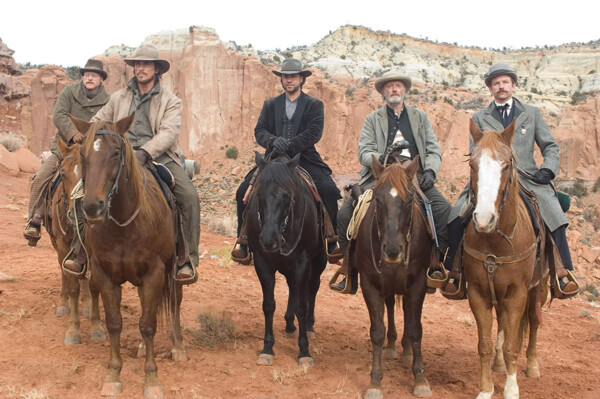
“3:10 to Yuma” Starring Russell Crowe, Christian Bale, Peter Fonda. Directed by James Mangold. 122 minutes. Rated R.
Mladen’s take
The good guy died and I didn’t care.
The bad guy lived and I didn’t care.
There wasn’t much to care about “3:10 to Yuma,” a cowboy movie bullet-holed with silliness.
The plot: A hapless rancher somewhere in Arizona stumbles into becoming part of a posse delivering a murderous, Bible-quoting outlaw to a train depot. There, the bad guy is supposed to be put on the “3:10 to Yuma” for delivery to a federal prison.
Almost from the get-go, the well-received (for reasons beyond me) movie starts to smell like a roadkill mule basking in the desert sun for two weeks.
For starters, the posse planned its escort of the intelligent killer much like the Bush administration planned for the Iraq invasion.
No kidding, there must have been at least a half-dozen opportunities for bad man Ben Wade, portrayed by Russell Crowe, to escape or just plain old stab, strangle, blow up or shoot all the men taking him to the train. He only kills a couple and that was because one took his horse and the other insulted his mother.
Wade faced a hangman’s noose but acted like he was taking a horseback tour of a playland inhabited by greedy railroad barons and bloodthirsty Apaches.
Oh, he’d mutter something now and then about his gang coming to save him but I kept asking, why?
My children’s guinea pigs could have saved themselves from the posse guarding Wade without intervention from our backyard squirrels, so why did the mastermind behind dozens of stagecoach robberies need his band of baddies to rescue him?
Throw in standard Hollywood fare such as really good looking women always being attracted to murderers, as well as absurdness like a father’s need to impress his son by dying and the movie almost cascades into farce.
By the way, the 3:10 train to Yuma is about five minutes late, so the director could squeeze more loony violence into the film.
Dang and dadgum, the movie was rotten as a polecat in heat.
The DVD box claimed “3:10 to Yuma” was the best Western since “Unforgiven.” All that must mean is that no one had made a cowboy movie since Clint Eastwood’s bone fide award-winner in 1992.
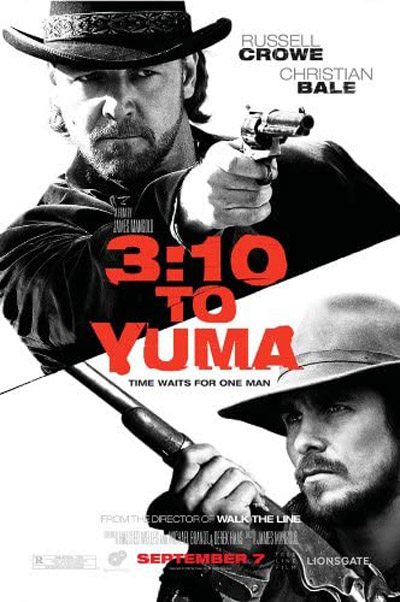
Del’s take
The way I see it there are five basic movie western plots:
1. Ex-gunslinger forced to strap on his six-shooter.
2. Mysterious stranger rides into town, agitates locals.
3. Ornery land baron steals water/land/cattle/women, must be made to pay.
4. Cowpokes drive cattle through injun territory and bond.
5. Sheriff jails bad man; bad man’s gang lays siege to jail.
Fortunately, “3:10 to Yuma” does not embrace any one of these hackneyed plots. Unfortunately, it embraces ALL of them in a Frankensteined pastiche of cliches, revisionism and logic flaws that left me wondering if Hollywood will ever again tell a decent story.
In “Yuma” we have English actor Christian Bale tasked with bringing Australian actor Russell Crowe to Yuma, where he will board a train and be taken to jail. What’s the matter, Hollywood? Couldn’t find an American actor?
Bale is a milquetoast kinda guy disliked by his bloodthirsty 14-year-old son, who wishes Dad would grow a pair and blast the bad guys to smithereens. Crowe is a hard-drinkin’, stagecoach-robbin’, murderin’ varmint who somehow gets caught and shipped off to Yuma in a long and perilous journey fraught with escape opportunities and conniving Native Americans. Close behind is Crowe’s gang, led by his eerily amoral No. 2 who bears an uncanny resemblance to every James Bond bad guy’s triggerman.
Let’s do a cliché check:
No. 1 – check. Bale is a former soldier who wants to spend his golden years cowpoking. No. 2 – check. Crowe is the menacing bad guy who rides into town, runs everyone out of the saloon, corners the local hooker … you get the picture. No. 3 – check. Bale is just a poor rancher who needs money or his ranch will go under. No. 4 – check. We get lots of philosophizing and empathizing on the hegira to Yuma. No. 5 – check. Two sieges – count ’em – TWO!
The movie ends with a totally unbelievable moment of moral clarity that could only have been dreamed up by a scriptwriter who wears peach-colored Polos to yoga practice.
This stinker was more aggravating than entertaining. I give it 10 yawns.
Mladen Rudman is a former journalist and technical editor. Del Stone Jr. is a journalist and author.
Video

Scene from SUNSHINE
“Sunshine” Starring Cillian Murphy, Chris Evans, Rose Byrne, Michelle Yeoh. Directed by Danny Boyle. 107 minutes. Rated R.
Del’s take
I read the hype for “Sunshine” and was prepared to have my socks blown off. When Kari offered to let me borrow her Netflix rental I jumped at the chance, even splurging on a pizza for what was pitched as the reinvention of the science fiction movie.
I can sum up my opinion of “Sunshine” in five words: Stupid people doing stupid things.
“Sunshine” is like that gorgeous blond you admire from afar until you work up the courage to introduce yourself … only to realize minutes later this is perhaps the dumbest person you’ve ever met in your life.
What a disappointment.
In “Sunshine,” the sun is dying. But humanity has scrounged every bit of its fissionable material to build a bomb that will create a “sun within a sun.” (What a stupid premise – even if a bomb the size of Earth itself were hurled into the sun the effects wouldn’t be significant. But don’t get me started.)
Our crew must fly the spacebomb (like this movie) into low solar orbit, launch the bomb and skedaddle before their butts are fried. They represent the second such attempt; the first ship mysteriously disappeared.
As they approach the planet Mercury they detect strange radio signals – it’s the first spaceship, adrift in that charbroiled region of space. Should they change course and attempt a rescue? (No!, you’re screaming at the screen. The fate of humanity rests on the success of your mission! Don’t sacrifice an entire planet for the eight-member crew of another spaceship who are probably dead anyway!)
But OF COURSE they change course (stupid). Then, one of the engineers forgets to reorient the shields and the spacecraft is threatened with incineration (really stupid). In order to fix it they must go outside and manually lower the shield plates. In the process the captain gets incinerated (beyond stupid) and the greenhouse, which generates their oxygen, is burned up (conveniently stupid). So they’re forced to rendezvous with the other ship … which just happens to be haunted by the insane spirit of its microwaved captain … he manages to find his way to the second ship and wreak havoc. …
I won’t tell you how “Sunshine” ends because (a) you shouldn’t care, (b) you should have switched off the DVD player and tuned in “Extreme Home Makeover,” and (c) it’s stupid.
My advice is stay away from this train wreck of plot holes, logic flaws and non sequitors, and use your time for a more meaningful pursuit … like watching ice melt.
“Sunshine” gets five yawns.

Mladen’s take
The pizza Del ate watching “Sunshine” must have gone down wrong. But, instead of getting heartburn, Del fell victim to brain-burn.
“Sunshine” is a fine movie with very good special effects that don’t overwhelm the plot.
The movie has a purpose.
It’s about sacrifice and conceit. It’s about hope and despair. And it has a couple of cute and brainy ladies as co-stars.
Slowly unfolding mishaps, each more consequential than its predecessor, transform the 90 million mile journey to save Earth from amiable boredom in the beginning to a tense, other-worldly sci-fi thriller toward the end.
Del mocks the scientist that forgot to reset Icarus II’s sunshield, which jeopardized the mission, after changing the vessel’s course to rendezvous with a derelict spaceship.
But Del, a rabid space exploration enthusiast, has conveniently forgotten a real-life incident Sept. 23, 1999.
Hyper-trained scientists working to put NASA’s $125 million probe Climate Orbiter in orbit around Mars confused each other when one team used English measure units — inches, feet — and the other, metric units — centimeters and meters.
The likely result was an expensive machine plummeting through the Red Planet’s atmosphere and burning up.
People do make mistakes — I mean look at what the Supreme Court did when it put Bush into the White House nearly eight years ago — and that’s a fact.
“Sunshine” doesn’t have the majesty or grandeur of, say, Kubrick’s “2001: A Space Odyssey.”
But, its ending is intelligible and, ultimately, redeeming.
“Sunshine” is good enough for me to consider adding it to my DVD collection, right there next to “Godzilla vs. Megaguirus.”
Mladen Rudman is a former journalist and technical editor. Del Stone Jr. is a journalist and author.
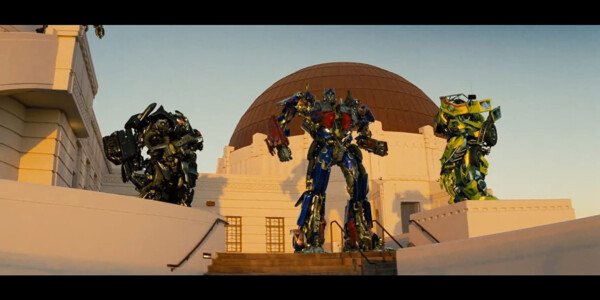
“Transformers” Starring Shia LaBeouf, Megan Fox, Josh Duhamel, John Voight, John Turturro. Directed by Michael Bay. 144 minutes. Rated PG.
Mladen’s take
It’s becoming a habit, one I must shed, or, before I know it, it’ll end with me finding something redeeming about the Bush administration.
“Transformers” is another movie — “Bug” falls into the same category — that does one brief thing right: forcing me to temper an otherwise bitter review that’s based on the dozens of things that went wrong.
The film’s nearly saving grace happens toward the end.
Bad-bot Megatron, sprawled on a crushed roadway after falling from a skyscraper during battle with good-bot Optimus Prime, finds itself near a human.
The four-story-tall robot utters, “Disgusting” and, using its index finger, flicks the human dozens of feet into a car.
Hilarious, because that’s the way I feel about humanity.
It’s too bad my index finger isn’t large enough to flick a grown man through the air. Then again, I’d have to use the finger ceaselessly for years to flick everybody that needs flicking.
“Transformers” is visually glorious crap. The movie is a vast advertisement for toys, GM vehicles that never get dirty and the Air Force. See it for no other reason than this: It’s cheaper now that it can be rented on DVD than when it was in theaters.

Del’s take
You’ll have to forgive Mladen. A big walrus of a guy flicked him off and he’s still hanging from a branch by the waistband of his Hanes.
It’s cut off the circulation to his brain.
Of course “Transformers” is crap, Mladen. Were you expecting “Anna Karenina”?
I too was expecting to hate “Transformers,” for the following reasons:
It was directed by Michael Bay, who managed to turn Pearl Harbor into a thrill ride at Universal.
And I could never keep track of who’s who: Is Vomitor a good robot or a bad robot?
Finally, if nature called at 3 in the morning and, on your way to the bathroom, you stepped on one of the approximately 10,000 pieces of Transformer toys left on the floor by your nephews, well, you can forget making it to the toilet.
But I was pleasantly surprised by “Transformers.” It’s a fun story told in a fun way.
The pace is fast, the dialogue snappy, the special effects mind-blowing and it never, ever takes itself seriously.
Casting Shia LaBeouf in the lead role was smart – his Ritalin-deprived approach plays nicely with the movie’s other parts. And Megan Fox is sufficiently sexy to compel LaBeouf’s romantic fantasies – clumsily adolescent fantasies – without posing any serious threat to what I’m assuming is his virginity.
If you accept “Transformers” for what it is – a bit of innocent fun that requires 144 minutes of your life – you won’t be disappointed.
Now, somebody help Mladen down from that tree.
Mladen Rudman is a former journalist and technical editor. Del Stone Jr. is a journalist and author.
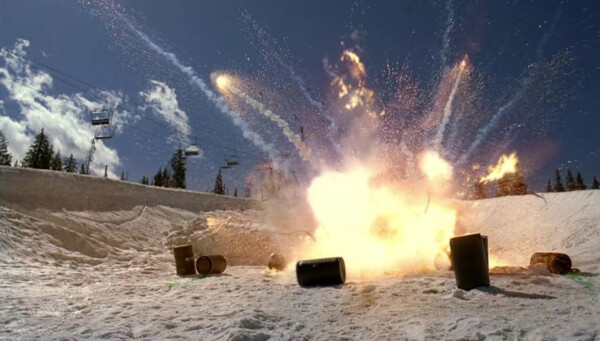
Image courtesy of Sony Home Entertainment.
“Ice Spiders” Starring Vanessa Williams, Patrick Muldoon, Thomas Calabro. Directed by Tibor Takacs. Amazon Prime. 90 minutes. Rated R.
Del’s take
Dude, didn’t we just review this movie?
Ski bums, bimbos and crazy old coots trapped at a ski lodge by a band of marauding. …
Wait … wait … it’s coming back to me. …
Sharks! That’s what I was thinking. “Avalanche Sharks.”
Except this isn’t “Avalanche Sharks,” not by a long shot, which is not a criticism of “Avalanche Sharks” though the movie deserves every bit of scorn I can shovel on its wriggling carcass.
This is “Ice Spiders,” an equally wretched presentation that nonetheless comforts me. All those bad feelings about none of my books being picked up by Hollywood? It ain’t because they suck. Maybe they don’t suck enough.
I’m trying to figure out who plagiarized whom because “Ice Spiders” and “Avalanche Sharks” are essentially the same movie. Change a few character names and you’ve got “Avalanche Spiders” or “Ice Sharks.” I actually prefer “Ice Sharks” as a title.
The plot goes something like this: Dan “Dash” Dashiell (Patrick Muldoon) is a ski instructor at a hidden mountain resort watching newbies to the slopes crash into each other on the bunny run. Once, he was an Olympics downhill hopeful, but a dreadful injury dashed those aspirations.
Dr. April Sommers (Vanessa Williams) is a biologist at a hidden military laboratory who is trying to make spiders bigger so they’ll spin more silk, which can be used to make bulletproof vests for the troops. But her boss, Professor Marks (David Millbern), has secretly amped up the growth hormones being fed to the spiders. See what they did there? They de-eviled Dr. Sommers, so that when the spiders escape the lab and start devouring the bunny run bumblers, she can sermonize about the evils of ambition (too bad it wasn’t corporate America – THAT I could believe).
Did I say something about spiders eating people? Oh yes, it’s a bloody arachnabuffet as killer spiders the size of Saint Bernards gallop across the ski runs, munching on those who aren’t aspiring Olympics downhill racers. You can see where this is going.
“Ice Spiders” has another quality in common with “Avalanche Sharks”: It too is a lo-fi cash grab by producers with modest aspirations. The script is dreadful, as is the acting (with the exception of Williams, who struggles gamely through the train wreck of dialogue as if she were trying not to laugh). The special effects are crappy even for CGI. And the plot is thoroughly, reprehensibly predictable.
I spent 90 minutes constantly checking the status bar to see how much time remained of this stupid flick. It was that bad.
Don’t blame me. Mladen chose this clinker. I give it a D-, which if memory serves is what I graded “Avalanche Sharks.”
I get to choose the next movie and if Mladen doesn’t step up his movie review selection game, I will punish him with another “Jane Austen Book Club.”
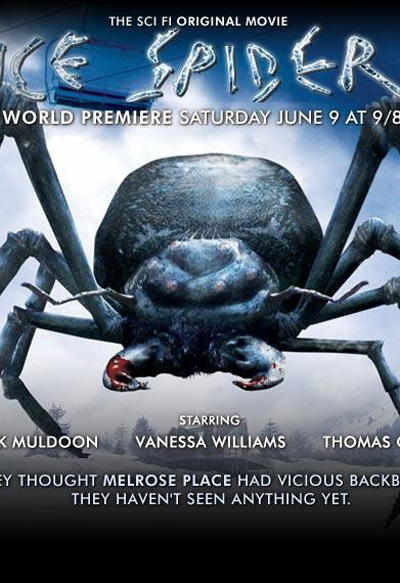
Mladen’s take
Del, you’re so off the mark with your review of “Ice Spiders” that I’m forced to conclude the following: You must think Trump is intelligent and human.
The difference between “Ice Spiders” (IS) and “Avalanche Sharks” (AS) is akin to the difference between Star Wars Episode 4 and Star Wars Episode 1. AS is a poor script wrapped by horrible acting and zapped in a microwave oven until everything explodes into a big, fat mess. IS is, well, not.
And, the star of IS isn’t Vanessa Williams. Hell, Vanessa Williams isn’t even Vanessa Williams. When the acting credits rolled at the beginning of the movie and Vanessa Williams’s name popped up, I thought, “Woohoo, it’s that Vanessa Williams. Miss USA. Singer. Model.” A 1980s bombshell, she was. Instead, I got a Vanessa Williams, the crappy actor and millennial, or whatever her generation moniker is, with, I must concede, decent cleavage.
IS avoids becoming AS because of the acting by Patrick Muldoon, who portrays Dash the ski instructor. He had, oh, panache. Muldoon converts dialogue that could’ve been utterly banal into something that seems close to plausible. His facial expressions and ever so slightly effete gestures as he delivers his lines adds a lighter mood to the film without turning it into a joke. Well done, Muldoon. You carried the day.
Muldoon’s performance is strong enough to overcome the movie’s weaknesses. But, Del, in one instance, is correct. The CGI spiders in this film are terrible. All six of them. They look like shitty animation added to a live-action film. Plus, the cockroaches in my kitchen are bigger than the spiders in the movie. I was far from terrified by the suspense of people placing themselves unknowingly in position to get attacked and dismembered. I take that risk every time I get up in the middle of the night to use the bathroom. My cockroaches are as big as helicopters and fly just as well. The practical effects in IS aren’t much better either, but they sure as hell are better than those in AS. At least the fake blood in IS was the color of blood. In AS, the blood was, I don’t know, a subdued fluorescent pink.
Also, you can’t overlook the political message in IS. The mad scientist uses the fascistic argument of national security to justify the spider mutation program, rationalize the deaths of fellow Americans, and openly threaten the lives of the survivors, if they said anything about the dangers they faced. Huh. Sounds like Trump and his justifications for his miserable COVID pandemic response.
“Ice Spiders” gets a B from me because of Muldoon’s acting, the production company’s insight to steal the plot from the very good movie “Deep Blue Sea” – enlarge an animal to get it to produce more of the substance you need to make a lot of money … I mean help humanity – and its R rating. Del gets an F for being Del in his review.
Mladen Rudman is a former journalist and technical writer. Del Stone Jr. is a former journalist and author.
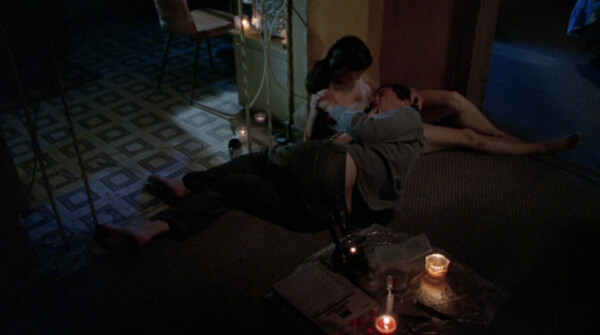
“Bug” Starring Ashley Judd, Michael Shannon, Harry Connick Jr., Lynn Collins. Directed by William Friedkin. 102 minutes. Rated R.
( Warning: Spoilers follow. )
Mladen’s take
Aside from seeing Ashley Judd naked and one moment of exquisite acting, I’m hard-pressed to find anything good about the movie “Bug,” recently released on DVD.
Granted, I’m no Einstein, but having to turn to the director’s explanation of the movie to figure out its meaning is reason enough to dislike the depraved, violent effort. Then, as it turned out, not even the director sounded like he understood the movie.
“Bug” is incomprehensible because there’s no reference point.
Is Peter Evans, played by Michael Shannon, really an Army soldier gone AWOL after being injected with some experimental concoction that makes him believe he’s being attacked by nearly microscopic aphids? Or is he just crazy?
And, how could he persuade Judd’s character, Agnes White, that she should help, and stay with him, after he contaminates her and her grungy motel-room home with the “bugs”?
Yes, White is vulnerable emotionally because the memory of her 6-year-old son disappearing while they grocery shopped shadows her every move, but would that make her gullible enough to self-immolate, with Evans, to end the movie?
The most sympathetic character in the film, ironically, is White’s abusive ex-husband played beautifully by Harry Connick Jr. in the role of Jerry Goss.
There’s a scene — it’s about two seconds long —where Goss, the wife-slapping ex-con, becomes more sympathetic, even human, than White or Evans ever could.
The moment is played with such stunning heartbreak that, all by itself, it damn near saves the film … damn near but not quite.

Del‘s take
Somebody hand me a can of Raid. I’m gonna spray this vile movie until it curls up and dies, like an invading midnight cockroach.
“Bug” is shocking because it highlights the kind of crap that passes for art these days – gratuitous violence inflicted by unsympathetic lunatics on self-appointed victims.
It’s one of those spiral-into-insanity kinds of films that invites us along for the ride. But after seeing this wreck weave back and forth across the center line I bailed and called the cops.
The Judd character is an unlikable victim whom we’re led to feel sorry for – sorry, I didn’t – because her kid was abducted. Her solution: stay drunk and beaten up.
The guys in her life are slimeballs who should be put away in cells – one, prison; the other, padded.
The story is … well, there IS no story. It’s just an extended vignette drenched in mayhem, madness and murder.
No law requires that a movie edify or enlighten. But it MUST entertain, and I ask: What’s so fun about watching two nutcases dissect each other?
Nothing – unless you’re a fan of hernia exams.
Don’t see “Bug.” Spray it. Step on it. Sic the cat on it.
Mladen Rudman is a former journalist and technical editor. Del Stone Jr. is a former journalist and author.
Video